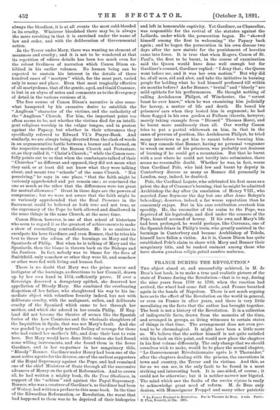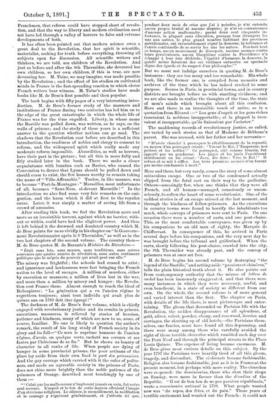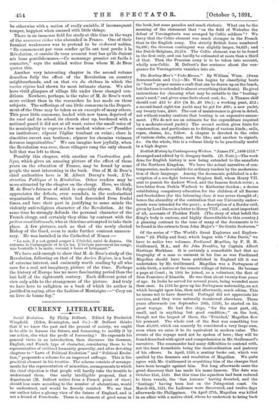FRANCE DURING THE REVOLUTION.*
THE object aimed at, and successfully achieved, in M. de Broc's last book, is to make a true and realistic picture of the state of France during the Revolution—that is to say, during the nine years from 1789 to 1798, when the reaction had arrived, the wheel had come fall circle, and France breathed again in the hands of Napoleon. There is not much arguing here as to the effect of 'the Revolution on the world in general, or even on France in after years, and there is very little moralising on the facts that the author has brought together. The book is not a history of the Revolution. It is a collection of indisputable facts, drawn from the memoirs of the time, and arranged in groups, as living witnesses to certain states of things in that time. The arrangement does not even pre- tend to be chronological. It might have been a little more so. We believe that the author himself is not quite satisfied with his book on this point, and would now place the chapters in his first volume differently. The only change that we should ourselves wish to make, would be to place the second 'chapter, "Le Gouvernement Revolutionnaire apres le 9 Thermidor," after the chapters dealing with the prisons, the executions in town and country, the Terror and its victims. And this, as far as we can see, is the only fault to be found in a most striking and interesting book. It is one-sided, of course ; it could not be otherwise ; but it is neither narrow nor bigoted. The mind which saw the faults of the ancien regime is ready to acknowledge great need of reform. M. de Broc only desires, with Monseigneur Freppel and many other patriotic • La Prance Pendant is BM:elution. Par is Vicomte de Proc. 2 vols. Paris : E. Pion, Nonrrit, et Cie. 1891.
Frenchmen, that reform could have stopped short of revolu- tion, and that the way to liberty and modern civilisation need not have led through a valley of horrors to false and extreme developments of both.
It has often been pointed out that modern science owes a great deal to the Revolution, that her spirit is scientific, materialist, seeking for truth before everything, throwing all subjects open for discussion. All scientific writers and thinkers, we are told, are children of the Revolution. And just as before and after the 9th Thermidor, she devoured her own children, so her own children, if this is true, are now devouring her. M. Paine, we may imagine, was made possible by the Revolution ; and the effect of his studies on cultivated minds in France is the fast-spreading reaction to which clever French writers bear witness. M. Taine's studies have made books like M. de Broc's first possible and then popular.
The book begins with fifty pages of a very interesting intro- duction. M. de Broc's former study of the manners and institutions of France during two centuries has led him on to the edge of the great catastrophe in which the whole life of France was for the time engulfed. Liberty, in whose name the Bastille was pulled down, was written, as he says, on the walls of prisons ; and the study of these years is a sufficient answer to the question whether nations can go mad. The shadows that the Revolution cast before are described in this introduction, the readiness of nobles and clergy to consent to reform, and the widespread spirit which really made any moderate reform impossible. Absurdities, as well as horrors, have their part in the picture ; but all this is more fully and fitly studied later in the book. There we make a closer acquaintance with lunatics such as Barere, who caused the Convention to decree that Lyons should be pulled down and should cease to exist, the few houses worthy to remain taking the name of " Ville-Affranchie." Toulon, in like manner, was to become "Port-la-Montagne " Marseilles, most unfortunate of all, becomes "Sans-Nom, ci-devant Marseille ! " In the introduction we also find some very fair remarks on the emi- gration, and the harm which it did at first to the royalist cause. Later, it was simply a matter of saving life from a crowd of assassins.
After reading this book, we feel the Revolution more and more as an irresistible torrent, against which no barrier, with- out or within, could have had the slightest power. And thus it left behind it the drowned and desolated country which M. de Broc paints for us so vividly in his chapter on "le Gouverne- merit Revolutionnaire apres le 9 Thermidor," as well as in the two last chapters of the second volume. The country then— M. de Broc quotes M. de Barante's Histoire tin Directoire- "Etait sans lois, sans mceurs, sans traditions, sans autres souvenirs que quatre annees de revolution, sans autre sentiment politique que le mepris du pouvoir qui avait pose stir elle."
The misery was frightful ; the schools had ceased to exist; and ignorance and lawlessness were fast bringing the French nation to the level of savages. A million of murders, either by execution or massacre, a million of lives lost in the war, and more than a million by misery and hunger : the R evolu- tion cost France these. Almost enough to reach the ideal of Robespierre : "La generation qui a vu l'ancien regime le regrettera toujours ; ainsi tout individa qui avait plus de quinze ans en 1789 doit etre egorge !"
The darkness of M. de Broc's first volume, which is chiefly engaged with revolutionary justice and its results in prisons, executions, massacres, is relieved by stories of heroism, patience and kindness, many of which are new to us, some, of course, familiar. No one is likely to question the author's remark, the result of his long study of French society in its glory and its fall—" Ce sera le supreme honneur de l'ancien regime, d'avoir, en quelque sorte, rachete ses erreurs et sea fautes par l'heroisme de sa fin." But he shows us beauty of character in all ranks of life. When people are dying of hunger in some provincial prisons, the poor artisans of the place lay aside from their own food to part des prisonniers.
And the gay courage which carried with it the rules of polite- ness, and made an agreeable society in the prisons of Paris, does not shine more brightly than the noble patience of the prisoners of Orange, described most touchingly by one of them :—
" Celui que les malheureux n'implorent jamais en vain, fut notre seul secours. L'esprit et le ton de cette maison offraient Fimage d'un stoicisme religieux. Le silence, is recueillement, la meditation et is courage y regnerent generalement, et j'atteste ici que,
pendant deux mois de crise que j'ai 1 peindre, is n'ai entendu aucun propos brutal ni aucune dispute; je n'ai en connaissance d'aucune action malhonnete; parmi deux cent cinquante in- fortunes, is plupart sans education, presque tons etrangers les uns aux autres, le plus grand nombre habitant des provinces meridionales, out invariablement *914 is douceur, is tolerance et l'envie continuelle de se servir les uns lea autres. Pendant tout ce temps, aucun mouvement de desespoir, aucune menace centre leurs persecuteurs, aucun blaspheme centre is Providence n'a echappe lour eine dechiree; l'egalite d'humeur, is douceur, is gaiete memo faisaient des ass victimes entassees un spectacle digne des egards et du respect d'un philosophe."
Bat we must not indulge ourselves in quoting M. de Broc's instances : they are too many and too remarkable. His whole book, like the former one, is compiled from memoirs and archives of the time, which he has indeed studied to some purpose. Scenes in Paris, in provincial towns, and in country districts are brought before us with startling vividness; and we are also made to realise the thoughts of the time, the state of men's minds which brought about all this confusion. Here and there is an irresistible touch of satire, as in a quotation from Rivarol :—" Les gens d'esprit et les gens riches trouvaient la noblesse insupportable ; et la plupart la trou- vaient si insupportable, qu'ils finissaient par l'acheter."
The maddening records of revolutionary justice, so called, are varied by such stories as that of Madame de Bethune's parrot. She was accused, with her father and her servants- " D'avoir cherchd a provoquer Is retablissement de la royaute, au moyen d'uti perroquet criant: 'Vivent Is Roi, 1 'Empereur, nos pretres et les nobles ! ' Ce perroquet, cite comma temoin, fut apporte par nn gendarme. Les juges et les jures l'exciterent inutilement en lui criant : Jaco, dis done: Vivo le Roi ! ' 11 refusa, at se mit a suffer. Les trois premiers accuses n'en furent pas moms condamnes a mort."
Here and there, but very rarely, comes the story of some almost miraculous escape. One or two of the condemned actually slipped from the fatal cart on their way to the guillotine. Others—amazingly few, when one thinks that they were all French, and all human—managed, consciously or uncon- sciously, to soften the heart of some revolutionist. One of the saddest stories is of an escape missed at the last moment, and through the kindness of fellow-prisoners. As the executions in country towns were found to horrify the inhabitants too much, whole convoys of prisoners were sent to Paris. On one occasion there were a number of carts, and one post-chaise. This, as the most comfortable conveyance, was given up by his companions to an old man of eighty, the Marquis de Chiffrevast. In consequence of this, he arrived in Paris several days before his companions, and the very next day he was brought before the tribunal and guillotined. When the carts, slowly following his post-chaise, crawled into the city, the 9th Thermidor was already past, and the convoy of prisoners was at once set free. .
M. de Broc begins his second volume by destroying "the legend of the Bastille," and setting aside "passions et chimeres," tells the plain historical truth about it. He also points out from contemporary authority that the misuse of lettres de cachet has been immensely exaggerated, and that there were many instances in which they were necessary, useful, and even beneficent, in a state of society so different from our own. On the whole, the second volume is of more general and varied interest than the first. The chapter on Paris, with details of the life there, is most picturesque and enter- taining. The gloom that descended on Parisian life with the Revolution, the sudden disappearance of all splendour, of gold, silver, velvet, powder, ebony, and rosewood, liveries and carriages, the shutting up of old hotels,—the Parisians them- selves, one fancies, must have found all this depressing, and there were many among them who carefully avoided the sight of those terrible charrettes which rumbled each day over the Pont Neuf and through the principal streets to the Place Louis Quinze. The expense of living became enormous. M. de Broc gives most curious details on this subject. By the year 1797 the Parisians were heartily tired of all this gloom, tragedy, and discomfort. The ci-devants became fashionable.
Religion also became fashionable, just as it is in France at the present moment, but perhaps with more reality. The churches were reopened: the dominicains, those who shut their shops on Sunday, were more in favour than the dicadins of the Republic. "II eat de bon ton de ne pas paraitre republicain," wrote a conmissaire national in 1798. What people wanted now was "du repos, des fetes, et du pain." These years of terrible excitement had wearied out the French : it could not be otherwise with a nation of really amiable, if inconsequent temper, happiest when amused with little things.
There is an immense field for study at this time in the ways of the nouveaux riches who abounded in France. One of their funniest weaknesses was to pretend to be ci-devant nobles. "lie commencent par vans confier gulls ont tout perdu h in Revolution, et ensuite us vous avouent tout bas qu'ila etaient nes bons gentilshommes.—Ce mensonge greasier eat facile h connaitre," says the unkind writer from whom M. de Broc quotes this.
Another very interesting chapter in the second volume describes fully the effect of the Revolution on country neighbourhoods, and on that vie du chdteau in which the ancien regime had shown its most intimate charm. We also have vivid glimpses of village life under these changed con- ditions. Nowhere, perhaps, is the value of M. de Broc's work more evident than in the researches he has made on these subjects. The sufferings of one little commune in the Depart- ment of the Orne may be taken as an example of many others. This poor little commune, loaded with new taxes, deprived of its cure and its school, its church shut up, burdened with a national guard it did not at all want, raises the small voice of its municipality to express a few modest wishes :—" Posseder un instituteur; reparer reglise tombant en ruine ; clore le cimetiere ouvert nun bestiaux ; reparer lee chemins vicinaux devenus impraticables." We can imagine how joyfully, when the Revolution was over, these villagers rang the only church bell that was left to them.
Possibly this chapter, with another on l'instruction pub- lique, which gives an amazing picture of the effect of these years on the education of France, may be found by some people the most interesting in the book. One of M. de Broc's chief authorities here is M. Albert Duruy's book, L'in- struction Publique et la Revolution. Other readers may be more attracted by the chapter on the clergy. Here, we think, M. de Broc's fairness of mind is especially shown. He fully appreciates the defects, even scandals, in the ecclesiastical organisation of France, which had descended from feudal times, and bore their part in justifying to some minds the violently anti-religious character of the Revolution. At the same time he strongly defends the personal character of the French clergy, and certainly they shine by contrast with the pretres constitutionnels, who at this time attempted to take their place. A few pictures, such as that of the newly elected Bishop of the Gard, seem to make further contrast unneces- sary. He was installed in the Cathedral of Nimes :— "Le soir, ii y eut grand souper i l'eveche, suivi de clauses. On entonna le Carmagnole et le ca ira. L'eveque parcourut lee range, une bouteille k la main, versant k boire et trinquant."
We have said enough to show that M. de Broc's study of the Revolution, following on that of the Ancien _Regime, is a book of extreme interest, and eminently worth reading by all who care for a real, not imaginary, picture of the time. Perhaps the history of Europe has no more fascinating period than the last half of the eighteenth century. Each different point of view only adds to the strangeness of the picture. And truly we have here to enlighten us a book of which its author is justified in saying, after the fashion of Montaigne :—" Cecy est an Eyre de bonne foy."




































 Previous page
Previous page